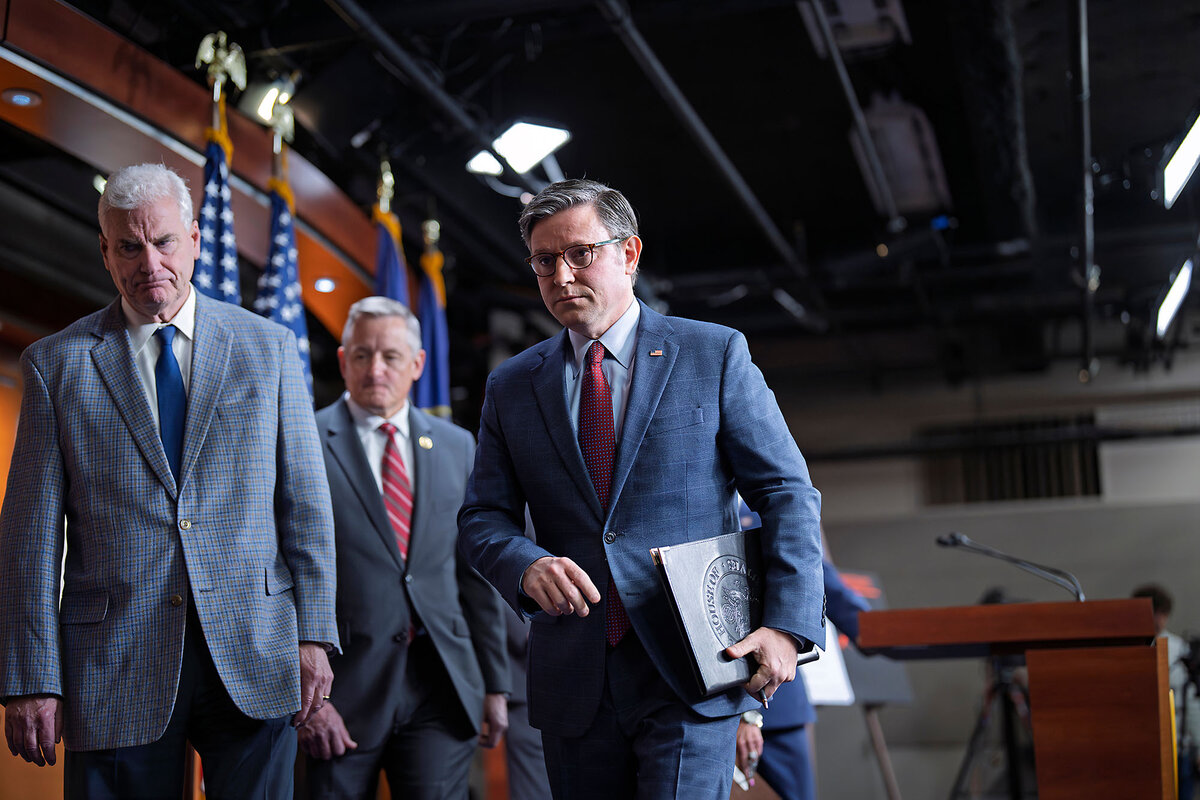Adelita Grijalva has waited since September. What to know about the House-seat delay.
As of this week, the 813,000 voters in Arizona’s 7th Congressional District, which hugs the Mexico border, will have been without representation in Congress for a full month. Democrat Adelita Grijalva, who handily won the district’s September special election to fill her late father’s seat, has yet to assume her duties because Republican House Speaker Mike Johnson has delayed her swearing-in, citing the ongoing shutdown.
Tensions over the empty seat continue to mount. This week, Ms. Grijalva and the state of Arizona filed lawsuits against the Republican-led House of Representatives and Speaker Johnson, alleging that his refusal to seat her exceeds his lawful authority.
“We’re going to court because this is an abuse of power that strikes at the foundation of our democracy and would set a dangerous precedent for the future,” Ms. Grijalva's staff told The Monitor in an emailed response.
Why We Wrote This
Historically, representatives who win special elections are often sworn in within days of victory. Now a prominent delay is stirring controversy – and lawsuits.
In her 17-page filing, Arizona Attorney General Kris Mayes argues that Speaker Johnson is withholding representation from the people of Arizona’s 7th District. She and other Democrats have accused the speaker of blocking Ms. Grijalva for political reasons, including preventing a vote on the release of records related to Jeffrey Epstein, a disgraced financier and convicted sex offender.
How unusual is this delay?
Typically, after winning special elections, representatives-elect are sworn in within hours or days of their victory.
“It’s normal for a then-winner of a special election to head to Washington straight away,” says Steven Smith, a professor of political science at Arizona State University and a leading scholar of congressional politics. “The winner is always eager to get sworn in as a member of the House as quickly as possible.”
But as the latest government shutdown stretches into the second-longest in U.S. history (the longest was during Mr. Trump’s first administration, in 2018–2019), Mr. Johnson has chosen to keep the House in recess. Without a regular House session, he says, Ms. Grijalva will not be sworn in.
 J. Scott Applewhite/AP
J. Scott Applewhite/AP
Rejecting accusations that he is playing politics, Speaker Johnson has repeatedly blamed Democrats for the shutdown and, therefore, the delay. He has cited “the Pelosi precedent,” referring to the former Democratic House Speaker Nancy Pelosi’s seating of some newly elected Republican members after the House returned to a full session. Mr. Johnson has also said that he will swear in Representative-elect Grijalva when the House returns to a regular “legislative session,’’ not an emergency “pro forma’’ session.
While not holding regular sessions, the House has held pro forma sessions every few days since the shutdown began Oct. 1. This past April, Mr. Johnson swore in two Republican representatives, Jimmy Patronis and Randy Fine, from Florida during a pro forma session, sparking pushback from Democrats over that move.
What is the political significance of this House seat, and how does it relate to the Epstein case?
Every seat matters with the House now under razor-thin Republican control, with 219 Republicans and 213 Democrats currently. Republicans need near-unanimity within their caucus to pass partisan legislation.
Ms. Grijalva’s seat – and vote – is already key to passing a petition that the vast majority of House Republicans oppose about the Epstein case.
A total of 218 signatures is needed for a discharge petition to force a vote on the release of files involving Mr. Epstein, whose 2019 jail-cell death was attributed by investigators to suicide, as he awaited trial for alleged sex trafficking of minors. He is reported to have had long-standing ties with numerous influential people, including now-President Donald Trump.
Before Ms. Grijalva’s victory, a bipartisan group led by Republican Thomas Massie of Kentucky and Democrat Ro Khanna of California had secured 217 signatures. Ms. Grijalva has vowed to be the 218th signature to force the vote.
While Democratic leaders have pointed to the Epstein files as the reason Mr. Johnson has denied Ms. Grijalva’s swearing-in, the speaker has repeatedly rejected that assertion. “It has nothing to do with that at all,’’ he said in a press conference on Oct. 7.
What does this delay mean for Arizona’s 7th District constituents?
After the death of Ms. Grijalva’s father, Rep. Raúl Grijalva, in March, his seat was left vacant. But his office was not. Under House rules that apply to any member who has died, resigned, or been expelled, the office for Arizona’s 7th District remained open under supervision from the House Clerk, Kevin McCumber. Despite having no formal voting representation, the office’s staff remained in place to handle duties like casework and phone calls until a new representative took the seat.
After Ms. Grijalva was elected, however, the office was closed. With the door shut, uncertainty looms for the 7th District representative’s staff and her constituents. Dr. Smith suggests that constituents have been left with no direct contact to voice concerns, whether about votes in Congress or government programs amid the shutdown.
“You’re gonna pick up the phone and dial a number, and there’s not going to be anyone on the other end to answer,” says Professor Smith, referring to 7th District constituents.
Deepen your worldview
with Monitor Highlights.
Already a subscriber? Log in to hide ads.
The lack of representation also affects the towns, cities, and counties that shape the district.
“You don’t have someone sitting in hearings, asking questions of administration officials about issues that involve your district,” Professor Smith says. “You’re simply unrepresented in so many aspects of congressional activity.”